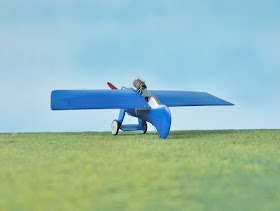First a few words regarding this article:
The objective of this series was to spark awareness and
interest regarding wonderful but lesser known designs, especially from the
Pioneer and Golden Era periods of aviation. Their creativity, significance, and
unparalleled charm are for me (and perhaps for many of you) a very important
but often overlooked part of aviation history.
I would also like to express my thanks to the ones that with
their supportive, affectionate, informative and sometimes witty correspondence
established a wonderful feedback that allowed me to improve my articles and
models. Thanks also for the invaluable help received from fellow modelers,
aviation enthusiasts and friends.
Was Mr. Arnoux a minimalist? Were his creations early
expressions of Minimal Art?
The concept of Minimalism, applied now to creations in diverse
media that characterize for being stripped to their essential components or
elements, both structurally and expression-wise, surely can be applied to
Arnoux’s aeronautic creations. His work in the field was precursory in many
ways, and the rationale behind his research can perhaps be summarized as:
-Which are the essential components of a plane?: a lifting surface, a power
plant, and the space necessary for the pilot.
I have previously dealt with one of Arnoux’s earlier
creations, the Stablavion of 1912
And this is the fully evolved concept, of 1922. Built to
compete in the Coupe Deutsch, a control problem and the subsequent rough
landing prevented this incredible design to enter the event. It was powered by
a Hispano-Suiza engine and the control surfaces at the wing’s trailing edge
acted as what we would now call elevons. Vision for the pilot was masterfully
impaired by having his head protruding on top of the trailing edge and behind
the cumbersome Lamblin “lobster-pot” radiator.
As usual with these odd-balls, references are not abundant.
Fellow modeler and friend Jim of the Puget Sound
helped a lot with this one. The plans that are around are good, but as usual
the few available photos quickly showed some minor inaccuracies, mainly in the
landing gear, lower tail and a few details in the radiator area.
Once the model engineering was solved (at least in paper) it
was out with the Mattel to vac the fuselage sides and just a bit of careful work
on the Lamblin radiator and the wood prop. The remaining parts, including some
interior and exterior details, were straightforward although the fuselage nose
took some fiddling because of the number of details grouped there.
No decals for this one, which alleviates the task, and just
some airbrushing for the two-tone livery that was the product of educated
guessing.
Minute, cute, plumped-looking “tailless” racer to celebrate
aviation history!






















No comments:
Post a Comment